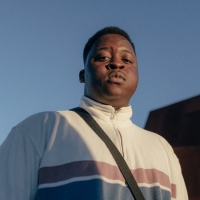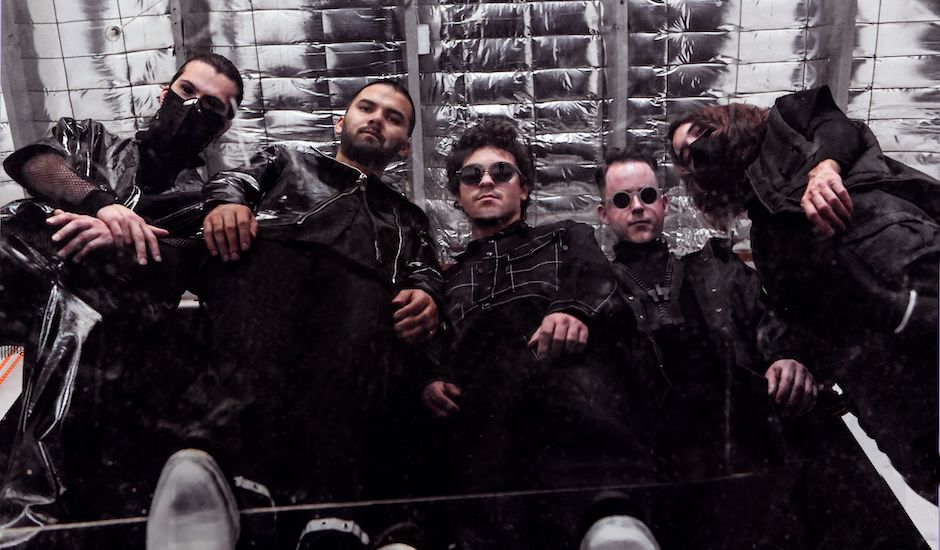 The rise and rise of Arno Faraji: "This is my thing."From an unsuspecting Unearthed High winner to one of Australian rap's most exciting names - #FARAJISZN is well in-effect.
The rise and rise of Arno Faraji: "This is my thing."From an unsuspecting Unearthed High winner to one of Australian rap's most exciting names - #FARAJISZN is well in-effect.

Northlane's Marcus Bridge grew up in hell – now, he's on top
On their new album Alien, the Australian metalcore band's lead singer takes a step back into his rocky childhood.
Warning: This article discusses drug abuse, drug violence, addiction and other themes. If you're struggling with drug addiction - or any other kind of addiction - go to ReachOut Australia or the National Drug Hotline for help.
Growing up, Marcus Bridge saw things no child should ever have to witness. As the son of two heroin-addicted parents, both he and his sister spent their years carting between hotels and motels across Sydney, slaves to a lifestyle that forced them to grow up years ahead of their time. Here, he dealt with his father’s subsequent aggression, his mother’s absence, and the infamous club owners and drug dealers of Kings Cross. He watched as a gunman broke down their motel room door and pointed straight at his dad – something he didn’t quite understand as a seven-year-old, but now thinks was probably the result of either selling drugs on someone else’s territory, or maybe a joust for money; and he watched as his sister succumbed to a meth addiction herself, while no one tried to deter her. When Bridge, now the frontman of beloved metalcore outfit Northlane, sings “I was raised in hell, I made it out by myself,” on the album’s leading single Bloodline, he means it.
Over the past decade, Northlane has been a band that has always embraced change and growth with open arms. Their line-up has shifted a few times, notably with Bridge joining in 2014 as the successor to Adrian Fitipaldes, but each album has been triumphant in its own right. Their three previous albums – Mesmer, Node and Singularity – all debuted in the top five, with the former two taking out ARIA awards for Best Hard Rock or Heavy Metal Album, and the band are no strangers to shredding all over the world. Their latest release, Alien, is possibly the biggest leap forward Northlane have had to date, showing an enhanced vulnerability and unflinching emotion, as Bridge stares down the barrel of what easily could’ve been his life. Musically, it was mainly written by guitarist Jon Deiley to be a “disgusting amalgamation of sounds” that theoretically shouldn’t have worked, yet the result is something far more exhilarating and captivating than anyone could’ve anticipated.
Alien, rather than dwelling in the past, rises from the ashes of what could have been and acts as a triumph of Bridge’s strength and choices. Each painful memory of addiction and abuse is expressed with defiance, and each deeply personal track is presented with courage. Years of discomfort and trauma are compacted into 11 songs: the gunman in Freefall, the addiction in Sleepless, the overdose in 4D, and the conflicting nature of sharing blood with something you don’t want to become in Talking Heads; in his mind, “no stone is left unturned” with this album. Bridge encapsulates what it means to have grown up in an unusual, unsettling household and have the power to ‘beat the odds,’ so to speak. And, while there are obvious cathartic aspects that come as a result of releasing these stories in a public space, the bigger picture comes from hope: “the light at the end of the tunnel is the fact I’m here singing these songs. I was able to see these situations and tell myself I’m not going to go down that path.”

This release is, in my eyes, Northlane’s most personal album to date; your childhood forms the basis of the story. At what point did you realise you wanted to dive into this on a public scale?
I’ve wanted to tell this story for quite a long time - it’s made up most of my life and the person I am – but I just never knew how to do it. When I joined Northlane, I always said my kind of song-writing style is more personal, something that’s a bit rawer, rather than outwardly worldly stuff. I’ve never really had the confidence to tell this story though, because it is so confronting and dark, but also in the fear that it might come off as just indulging in tragedy, which is not what I want to do. Now that we’ve had some time together as a band, and now that we’ve got this style of music coming through, it felt like the right time.
These songs are pretty heavy in nature, ranging from drugs and addiction to abuse, and they’re topics that are obviously really confronting to hear about. Do you want people to feel uncomfortable when they listen to the album?
Yeah, I think I do. For me, there’s a lot of music that talks about drugs, and for the most part, you hear a lot about drugs as a flex or something that’s made out to be really cool. [It’s] the idea of partying and doing drugs, and even to the extent of this “heroin chic” thing, that seems to be popping its head up of late. Heroin, especially, is not something that is glamorous; it’s not fun, and it doesn’t do any good for anyone around someone using that. I didn’t want to tip-toe around talking about that; I really wanted to talk about it in a gross way so people really would feel kind of uncomfortable. It was pretty important to me that these songs weren’t just thrown away as shock factor or as a soft message, when there is something important to say.
What was it like writing these songs and having to relive these moments?
It was a long, long process. When we first started trying to get these songs out, we wouldn’t be writing anything; the first couple of days we were just talking about it. For example, Bloodline was one of the first songs that we put out and, though it’s kind of the first toe in the water to kind of talk about this stuff, it took quite a long time to get certain metaphors down and be able to put the story into the right words, that isn’t just ‘this happened to me and this is how I feel.’ Some of the time, I don’t even really know how to write about how I feel or how I felt [growing up]. It was a matter of trying to blend all these feelings of anyone who’s gone through or is going through something like this into words but also into the emotion of how they’re sung.
It’s easy to write words about a certain feeling, but if you can’t feel that the person singing means those words, or has any passion about them, then it shows really clearly. It took a long time to be able to write these songs in the way I wanted to be, for that reason. Later down the track, as we started getting a bit more into a flow, it got a bit easier but it still was always a couple of days talking about the situation and unravelling the past, to then try to piece it back together in the form of a song.
Speaking of Bloodline, I was watching the video for that, which really mimics the aggressive, confronting demeanour of the song, but one of the comments underneath just said “I cried, I felt understood.” Do you ever think about the gravity this album could have on people who have been through similar upbringings and experiences?
That’s another reason why it was so important to get these songs right. Anyone who’s gone through this stuff would know the feelings and should know in some way what I’m talking about. Already there’s been an overwhelming response from people who have either been through a similar situation or something completely different, but they were able to… they felt comfortable to open up about it. That’s something that’s been really clear amongst people who have listened - the idea of someone in position opening up about something that they might feel embarrassed about, or something they’ve never felt comfortable talking about; it’s opened up a lot of doors for people. That was always an intention as well, I think music should mean something. If it’s self-indulgent or not really open to interpretation for people to tell their own story through it, I don’t think there’s a point. There’s definitely room for people to tell their own story in Alien, whether it’s similar to mine or not.
At the very least, you’re still opening a door, like you said, for people who hear Alien to develop a level of empathy that maybe they didn’t have before.
Yeah… I have friends who might passingly make a joke about heroin or meth or something because, I don’t know, for some reason that’s a ‘funny’ thing to do but it’s interesting because I feel like… I’m never angry or upset with these people, it just makes me a bit uncomfortable. I understand that they’ve never experienced something like that, and have no real scope of what saying something like that means around someone who’s been around those kinds of trials (which is perfectly fine, some people don’t deal with that shit), but I guess for me, this is a chance to at least open it up and show people that this is what happened. There should be an understanding around people who’ve gone through this shit. It’s the same as someone’s friend joking about someone’s mum passing away, it’s the same kind of sensitivity that you should have around your friends and the people around you. [That empathy] is just not spoken about enough for people to even have a gauge of it.
So, how do you try to replicate these emotions musically?
I’ve wanted to tell this story for a long time and it never felt right until John started sending through the instrumentals for this album. That was before we even started writing vocals or any lyrics to it. To be honest, from the get-go, the songs he was writing already matched that tone, so for me, it felt like this album was all meant to come together at this point. It wasn’t necessarily like we were writing these songs with the focus of just writing about my story, they came from the dark sounds and darker tones that John was writing and pulling for these new songs. In the end, I think the music more so influenced me to be able to start telling this story, whereas other albums might not have had the right tone to mention these topics. I think John was coming from [a place of] troubles in his own life, his personal life, but also troubles from the expectation of what we ‘should’ be doing. I think he found himself in a pretty dark spot of his own but that translated to the music and it all worked together with what I wanted to say. There was a pretty ying-yang; everything working together, kind of process, which is pretty rare.
How do you feel like this album is a progression of Northlane?
Well, we decided to self-produce this album and spend as much time as we wanted writing, which meant that no stone was unturned, and we could literally do whatever we wanted. In the past, with producers and engineers we’ve worked with, they’ve always done an amazing job, but it’s always been within a time-frame - usually no more than two months. Obviously, we’d be writing a lot longer than that, but when it comes to getting to the studio and trying things out, we didn’t really have that luxury before. Giving us all of this time up our sleeves meant we could truly explore every different sound or vocal delivery or change in a song structure, we got to try as many different things that we wanted. That meant that by the end we really found something that was a true encapsulation of all five of us as a band but also one unit who created something pretty special and something that we’re all extremely proud of.
I think in the past, we’ve always gone back and been like 'oh that guitar parts a bit weird', we’re pretty picky so I’m sure that will happen anyway, but at this point, there’s nothing like that for us. There’s nothing we can pick out and be like yep, that could’ve changed or that could’ve been better or whatever. We really made sure that every little thing we could’ve done was done and, as I said, no stone was left unturned.
I can imagine you would have this crazy sense of freedom with self-producing, but were there any challenges that came with it?
Knowing when something was done. Coming back to Bloodline, we recorded the chorus that’s on the song now (that was the very first chorus we recorded) but because it’s quite different to anything we’ve done before, it’s quite a low registered chorus that’s pretty monotonic, it’s pretty weird for us and a different direction, so we thought it was wrong. We kept writing different choruses; we wrote at least ten different choruses with different lyrics to try and make it work but eventually just ended up going back to the original chorus like yeah, that was the right one all along. That song went through so many changes but ended up going back to pretty much the first version we did, so that was a big lesson I think we learnt: if we’re sure of something or if we’re into the idea or we recorded it, it’s probably right and not to overthink it. The biggest challenge is telling yourself to stop.
Do you think this release is ambitious for Northlane?
I guess so. To be honest, it feels like a natural progression for us. Over the years we’ve learnt so much from other producers and we’ve learnt so much about ourselves as musicians and people, and I think we needed to do everything we’ve done before this to get to this point, and now we’re at the point where we can do whatever feels good and makes us happy. Is that ambitious? We never set out to change the game add all these elements we’ve never done before, that was never intended, it was just the natural progression of what we like as musicians and as people. The electronic elements come from John’s interest in electronic music, which I’m sure he much prefers to metal or heavy stuff, so it’s just us being us really. This is the first step in that direction of us being able to do completely whatever we want.
Northlane's new album, Alien, is out now via UNFD. Catch them on tour this October.
Follow Northlane: FACEBOOK
 The rise and rise of Arno Faraji: "This is my thing."From an unsuspecting Unearthed High winner to one of Australian rap's most exciting names - #FARAJISZN is well in-effect.
The rise and rise of Arno Faraji: "This is my thing."From an unsuspecting Unearthed High winner to one of Australian rap's most exciting names - #FARAJISZN is well in-effect.
 Rich Brian: The Sailor and The CaptainCatch Rich Brian, Indonesia's premier hip-hop export, back in Australia this month playing his latest album, The Sailor.
Rich Brian: The Sailor and The CaptainCatch Rich Brian, Indonesia's premier hip-hop export, back in Australia this month playing his latest album, The Sailor.